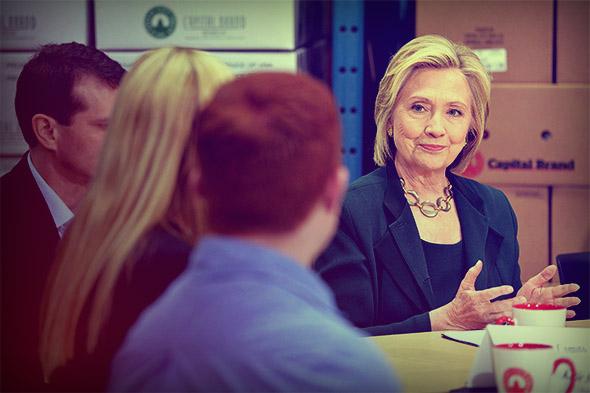MONTICELLO, Iowa—Speaking to a small group of Iowans—and in front of a big crowd of reporters—here on Tuesday, Hillary Clinton laid out what she said would be the four main tenets of her presidential campaign. Three of them—to build the “economy of tomorrow,” “strengthen families and communities,” and “protect our country”—were so vague and anodyne that she could have saved everyone some time by simply waving an American flag. The fourth, though, while not exactly concrete, was harder to dismiss: campaign finance reform by (almost) any means necessary.
“We need to fix our dysfunctional political system and get unaccountable money out of it once and for all, even if that takes a constitutional amendment,” Clinton said, throwing a populist hook to go along with the jabs she took at Wall Street during the same event. The former secretary of state didn’t elaborate on the specifics of her reform plan, but it’s widely assumed that she was lamenting Citizens United, the 2010 Supreme Court ruling that serves as a type of shorthand for the campaign laws that have allowed a deluge of outside spending to flood recent federal elections. Last summer, Clinton suggested she would “consider” supporting an amendment that overturned the ruling, an idea President Obama has also backed. It appeared on Tuesday that Clinton finally made up her mind.
Clinton is an unlikely champion of the cause: At best, it is ironic that she would take on the mantle of campaign-finance-reform crusader; at worst, it is hypocritical. Just last year, as my colleague Beth Ethier noted, the Center for Public Integrity dubbed her the “Citizens United candidate,” explaining that she would become the “beneficiary-in-chief” of the ruling that paved the way for today’s super PAC–dominated elections. That prediction has already proved prophetic, with super PAC Ready for Hillary helping to effectively clear the Democratic field even before she officially jumped into the race this week. And, as conservatives have been quick to point out, at roughly the same time Clinton was in Iowa decrying the role of big money in federal elections, her allies and other deep-pocketed liberal donors were meeting in San Francisco to figure out how to spend tens of millions on state ones. Clinton may believe the system needs fixing, but in the meantime she’s made it clear she won’t shy away from exploiting every advantage it offers her and her party.
But the gap between the future Clinton is calling for and the present she is operating in comes with its own advantages. Many progressives are understandably uncomfortable with Clinton’s close ties to Wall Street and other moneyed interests that are best positioned to exploit those same election-law holes she wants to fix, but if reform-minded advocates want those laws changed, they will be hard pressed to find someone with more resources to effect the change they want. Ironic, yes. But true.
The reality of our political system is that the most realistic way to fight big money is with big money of your own—and Clinton’s campaign coffers are in no danger of running dry. Last week, the New York Times estimated that her team and its outside allies are likely to collect in the neighborhood of $2.5 billion between now and Election Day 2016. Reform advocates will cringe at the thought of how much of that will be raised and spent by outside groups, but they’ll be better served in the long run by an imperfect candidate who could be president than by a perfect one who has no chance of sitting in the Oval Office. Better to wager that Clinton keeps her promises if elected than to bet that a less problematic candidate comes out of nowhere to pull off a miracle.
Still, Election Day 2016 is still 19 months away. It remains to be seen if Clinton is serious about keeping reform at the center of her campaign, and she’s so far (in week one) painted with only the broadest of brush strokes. We don’t know yet whether she will take aim only at Citizens United, or if she will call for more sweeping reforms along the lines of what Senate Democrats offered in 2010. The specifics of Clinton’s plan—and how she sells them from the stump—will go a long way toward deciding whether she can match her lofty campaign rhetoric.
Working in Clinton’s favor is the fact that she appears to have found a populist message that crosses partisan lines. A poll conducted in tandem by Democratic and Republican polling firms last year found that voters backed a constitutional amendment to counteract Citizens by a 2-to-1 margin. Even self-identified Republicans said they were on board, 54 percent to 36 percent, when presented with arguments for and against overturning the ruling. More generally speaking, polls have routinely showed that Americans are both concerned about the role of money in politics, and would vote to limit the amount of cash candidates could spend and raise if they could. That all bodes well for Clinton as she tries to find a signature issue that wins over skeptical progressives while not alienating moderates.
Working against her, though, is just how difficult the task at hand is likely to be—something her brief comments in Iowa alluded to. The reason that reform-minded advocates dream of a constitutional amendment—the longest of long shots—is because Congress appears unlikely to act on its own. Still, even that difficulty can be spun into a rallying cry. If Congress won’t act, and a constitutional amendment is all but impossible, then the best and perhaps only chance at meaningful campaign finance reform during the next decade is likely to come from the Supreme Court. That can’t happen unless we have a reform-minded president in office the next time a conservative justice retires. And the road to the White House is paved with super PAC money.
